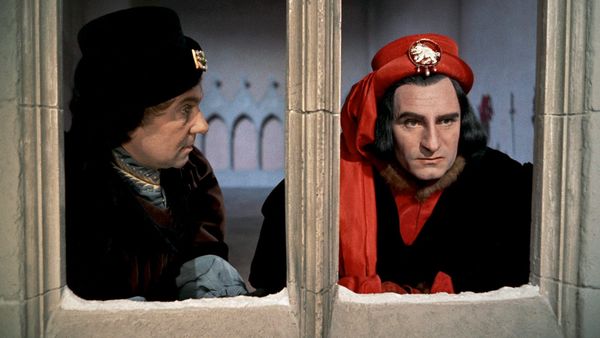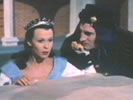Eye For Film >> Movies >> Richard III (1955) Film Review
Richard III
Reviewed by: Angus Wolfe Murray

While the Scottish king agonised over his dreadful deeds in Macbeth, Richard of Gloucester (Laurence Olivier), youngest brother of the kindly King Edward (Cedric Hardwicke), as the Wars of the Roses fell exhausted into the pit of history, positively preened himself in the murky mirror of murderous intent. When asked by his cousin Buckingham (Ralph Richardson) what to do about a noble lord (Alec Clunes) whose conscience was becoming a hindrance, Richard’s immediate response was “Chop off his head,” spoken lightly, with a playful smile. Within a day, the offending body part had been severed from its aristocratic moorings.
Shakespeare’s Richard III is a horror comic. Factually dubious, it portrays the rise and fall of a disabled psychopath, whose manipulative skills, withering wit, devious cunning and absolute ruthlessness leaves the dandified courtiers atremble with anticipation. Only the self-serving Buckingham can intellectually match him and because he is no threat to Richard’s royal ambitions he is used as a co-conspirator until his support is of no further value.

After Edward’s convenient death (natural causes apparently) Richard has to do a Kind Hearts And Coronets on the next in line. Already, he has arranged the assassination of his gentle brother Clarence (John Gielgud) – drowned in a barrel of wine – and now Edward’s boys, otherwise known as “the princes in the Tower,” have to be dealt with. At the same time, he has decided to marry the beautiful, young Lady Anne (Claire Bloom), in mourning for her murdered husband – no prizes for guessing who bumped him off – as well as have the widowed queen’s brothers locked up. No rest for the wicked, it seems.
With the use of bare, simple sets, superb Technicolor and a clever adaptation by Colley Cibber, cutting the wordage bare to its essentials, Olivier, in his role as director, emphasises the nature of evil as being (gasp!) humourous. Richard’s courtship of Anne, during which he invites her to run him through (“Take up the sword, or take up me”), is a hilarious play act, or would be if she wasn’t so traumatized by grief.
The production is flawless, dispelling schoolboy rumours that The Bard is boring. Olivier’s performance, so essential to the success of the film, has become lampooned and ridiculed by comedians to such an extent that Lord Larry’s reputation in the minds of many is based on a Max Wall caricature of a hunchbacked vulture, with a high, nasal rasp. What people forget is that pastiche is the highest form of flattery.
Olivier’s Richard captivates, seduces, dominates and fascinates in equal measure. It is a performance of unparalleled greatness - immensely intelligent, fiercely energetic, unnervingly funny and deeply disturbing. Even when flamboyance and theatricality exposes the actor’s weakness for the grand gesture – Richard’s death is a classic of camp – it somehow fits. His absolute control of all he surveys feels closer to perfection than a well-honed blade across the throat of a dissolute duke.
Reviewed on: 02 Aug 2007
















